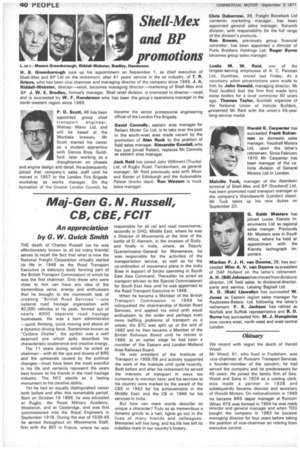Maj-Gen G. N. Russell, CB, CBE, FCIT
Page 42

If you've noticed an error in this article please click here to report it so we can fix it.
An appreciation by G. W. Quick Smith
THE death of Charles Russell (as he was affectionately known to all his many friends) serves to recall the fact that what is now the National Freight Corporation virtually started its life in 1948 as the Road Transport Executive (a statutory body forming part of the British Transport Commission) of which he was the first chairman. Only those who were close to him can have any idea of the tremendous verve, energy and enthusiasm that he brought to the mammoth task of creating "British Road Services"--one national road haulage organization with 40,000 vehicles at its peak, formed out of nearly 4000 separate road haulage businesses. He was a born administrator —quick thinking, quick moving and above all a dynamic driving force. Sometimes known as -Cyclone Charlie", the epithet was a well deserved one which aptly describes his characteristic exuberance and creative energy.
The 11 years during which he acted as chairman—with all the ups and downs of BRS and the upheavals caused by the political changes---must have been the most eventful in his life and certainly represent the years best known to his friends in the road haulage industry. The NFC stands as a lasting monument to his creative ability.
Yet he had an equally distinguished career both before and after this remarkable period. Born on October 19 1899, he was educated at Rugby, the Royal Military Academy, Woolwich, and at Cambridge, and was first commissioned into the Royal Engineers in September 1918. During the war of 1939-45 he served throughout on Movements Staff, first with the BEE in France, where he was responsible for all rail and road movements, secondly in GHQ, Middle East, where he was a Director of Movements at the time of the battle of El Alamein, in the invasion of Sicily, and finally in India, where, as Deputy Quartermaster-General for Movements, he was responsible for the activities of the transportation service, as well as for the co-ordination of movement plans in the India Base in support of forces operating in South East Asia Command. Thereafter he acted as transport adviser to the Special Commissioner for South East Asia until he was appointed to the Road Transport Executive in 1948.
When he became a Member of the British Transport Commission in 1959 he relinquished the chairmanship of British Road Services, and applied his mind with equal enthusiasm to the wider and perhaps even more baffling problems of transport as a whole: the BTC was split up at the end of 1962 and he then became a Member of the British Railways Board until he retired in 1964: at an earlier stage he had been a member of the Eastern and London Midland Area Railways Board.
He was president of the Institute of Transport in 1958 /59 and actively supported the work of the Institute until quite recently. Both before and after his retirement he served the interests of transport in ways too numerous to mention here: and his services to his country were marked by the award of the CBE in 1943 for his achievements in the Middle East; and the CB in 1946 for his services in India.
But how can mere words describe so unique a character? Truly as so tremendous a dynamo grinds to a halt, lights go out in the lives of many friends and colleagues. Memories will live long: and his life has left its indelible mark in our country's history:
Obituary
We record with regret the death of Harold Wood.
Mr Wood, 61, who lived in Frodsham, was vice-chairman of Runcorn Transport Services a founder-member of the concern, he had served the company and its predecessors for 45 years. He joined the family firm of Geo. Wood and Sons in 1926 as a costing clerk, was made a partner in 1928 and subsequently became director and secretary of Woods Motors. On nationalization in 1949 no became SIRS depot manager at Runcorr When RTS was formed in 1954 he was made director and general manager and when TOG bought the company in 1963 he became managing director for four years before taking the position of vice-chairman on retiring from executive control,










































































































































